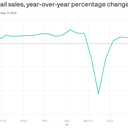Why January's blowout retail sales report matters

January's U.S. retail sales report showed a 5.3% gain, the third-largest month-over-month increase on record, trailing only the booming numbers seen in June and July, as states opened up after nationwide shutdowns because of the coronavirus pandemic.
Between the lines: January's big number was more impressive because it was 7.4% higher than in January 2020, whereas on a year-over-year basis both June and July's reports were below their commensurate 2020 figures.
Why it matters: The blowout reading — retail sales have averaged a 0.3% month-over-month gain over the life of the report and economists had predicted a 1.1% rise — shows that U.S. consumers were incredibly active in January and that they largely spent rather than saved their stimulus checks.
- That flew in the face of the significant increase in Americans' savings rates last year and surveys that showed more people would put their checks away or use them to pay down debt than spend them.
The big picture: The retail sales report also suggests that Americans may be in better financial shape than previously believed and have more confidence in the economy — or in the government to deliver more benefits.
- "The 2021 growth numbers have significant upside potential," Steven Ricchiuto, U.S. chief economist at Mizuho Securities USA, said in a note to clients.
- "Consensus GDP forecasts for 2021 were already at 2.9% and 4.9% for Q1 and the full year, respectively, and street forecasters are already upgrading their growth forecasts on this major surprise print. We will be upgrading our own GDP forecast, too."
Why you'll hear about this again: Goldman Sachs economists wasted no time upgrading their forecast, predicting the U.S. economy will grow 7% this year with the unemployment rate falling to 4.1% and core PCE inflation rising to 1.85% by year-end.
- The Atlanta Fed’s GDPNow tracker on Wednesday predicted the economy will grow at a 9.5% seasonally adjusted annual rate in the first quarter, up from a 4.5% estimate a week ago.
Yes, but: The report could pour cold water on some policymakers' appetites for another major fiscal spending package, which many argue is necessary to support the economy.
- "These numbers suggest the current fiscal policy setting is already over-calibrated, and the Biden proposal currently being debated is at least double current policy," Ricchiuto argued.
- "While the labor market and certain sectors of the economy are being held back by COVID and related government restrictions, overall, the spending data does not support the notion of an economy suffering from insufficient aggregate demand as we typically understand it."
- "The economy is suffering from an acute COVID problem, not a general demand problem."